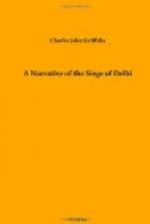Here first we heard the sound of distant cannonades, borne thus far to our ears by the stillness of the night—a sound which told us that our comrades before Delhi were still holding their position against the enemy.
At length, on July 1, just as the sun was rising, we emerged from a forest of trees on to the plain over which the army under Sir Henry Barnard had moved on June 8 to attack the entrenchments of the mutineers at Badli-ki-Serai.
July 1.—Eagerly we cast our eyes over the ground to our front, and with pride in our hearts thought of that gallant little force which had advanced across this plain on that eventful morn under a terrific fire from the enemy’s guns.
Soon we reached the entrenchments which had been thrown up by the rebels to bar the progress of our soldiers, and, lying in all directions, we saw numerous skeletons of men and horses, the bones already bleached to whiteness from the effects of the burning sun. Dead bodies of camels and oxen were also strewn about, and the stench was sickening. We were now about four miles from Delhi, and were met by a squadron of the 6th Carabineers, sent to escort us into camp. They received us with a shout of welcome, and, while we halted for a short time, inquiries were made as to the incidents of the siege.
We learnt that our small army, with the tenacity of a bulldog, was holding its own on the ridge overlooking the city, that sorties by the rebels were of almost daily and nightly occurrence, and that the losses on our side were increasing.
With the Carabineers in our front, the march was continued, the white tents of the besieging force appearing in sight about eight o’clock. Then the band struck up “Cheer, boys, cheer!” and, crossing the canal by a bridge, we entered the camp.
Crowds of soldiers, European as well as native, stalwart Sikhs and Punjabees, came down to welcome us on our arrival, the road on each side being lined with swarthy, sun-burnt, and already war-worn men. They cheered us to the echo, and in their joy rushed amongst our ranks, shaking hands with both officers and men.
[Illustration: DELHI, FROM THE MOSQUE PICKET.]
[Footnote 1: The heat even under such cover was intense, averaging 115 deg. Fahr.]
CHAPTER III
BEFORE DELHI
A situation had already been marked out for our encampment, and, directed by an officer, we passed through the main portion of our lines, and halted at the bottom of the ridge on the extreme left of our position. Some time was occupied after the arrival of the baggage in pitching our camp; but when all was concluded, Vicars and I started on foot to take our first view of the imperial city.
We walked a short distance to the right, and along the foot of the ridge, and then ascended, making our way to the celebrated Flagstaff Tower. We mounted to the top: and shall I ever forget the sight which met our gaze?




